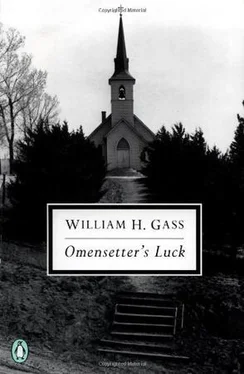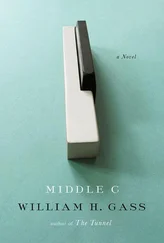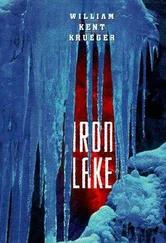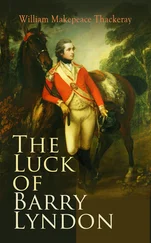This is the church. This is the steeple. Look inside and see all the people.
The testaments against his heart, he kept a firm grip on himself. Trailing kerchiefs, violet and green, pale hands like iris out of sleeves, the young girls were turning. That night he would dream of maidenly garments. He smelled sachets of lavender. People began shading their eyes and leaning forward. Omensetter was yelling come back. Arr-thurrl His brick-red neck was netted with thin lines. Piercingly, his daughters yelled come back, severing their words. Their bare feet were clenching pebbles and water ran down their legs. People shouted kum-baack! heyheyhey kum-baack! Children ceased running and scuffling. A few took hold of their mothers' hands. One of the Hatstat boys was standing on his head and his brothers were clapping. Kangaroo, Furber thought. Kangaroo, he almost shouted. Why in the world should I want to do that? Yazebo heenie, yazebo! The dog was tired when he turned. He was deeper in the water and his nose dipped once or twice. Higher on the bank, Furber saw the hat go on. He felt it spinning on its crown, the hooks in its band hanging down in the water to the nose and teeth of fishes. The dog had failed, and the hat that Furber had so often seen and hated, Sundays, on that thick unwholesome head was finally gone. He regretted that he had not flipped it from those popping eyes himself, and sailed it off. Now he felt no elation for what the wind had done. The dog bobbed and thrashed. If Omensetter swam for the dog, would he take off his trousers? Lord save us from that. Light streamed from the water and he passed his hand wearily over his eyes. The river was a streak of red on his lids. A jay was calling. He devoutly hoped the dog would drown.
It was a mistake to have come here. The women had red hands and peasant bodies — legs as thick as trees. Not that it mattered. He'd forsaken all that. Furber stirred, deliberately and painfully kicking his ankles. The book was uncomfortable. Not nearly wide enough, it was biting his thighs. He slid to the bench and immediately felt the damp through his trousers. The Cate girl, for instance, or May Cobb. What would happen to them? They'd grow dugs and hair like any woman. May Cobb already had. Blond doubtless, downy, curling under, perhaps a hint of red, of reddish… it was one of the laws of God. They'd carry their new mouths about with them for a few months — always moist, a bit inflamed. The farm boys would finger their breasts with less skill, certainly, than they milked the cows, preferring the unbuttoned flies of their friends. Their thick stubby fingers were like chewed on school pencils, rows of dents like rings around them, the paint broken and scaling, yellow mostly, why was that?… they had dirty, bitten, discolored nails; their hands were rough already; they had stupid hands; they had stumbling, bad-hearted hands; clumsily pawing hands, clumsily unhooking hands, poking, pulling, parting, jerking, why?. to insert a cold wet nose? ah, the dog with damp fur! say, chuck chuck Charlie, a smart slap on the butt and bottom's up old girl, that's love… mmmn pet the love dog, Dickie, nnnm? Eeee, goody geedge! Then to marry and settle down. How fares the thumb, boy? well? Aye, merry, 'tis the sign of the penis. With the women, look you, observe the ear. The parts appear and come together. So obesity and malice. So grumbling and nagging. So gossip, envy, spite, and avarice. Slowly settling into. So feminine weakness. Heartless piety. Savage morals. They come together. No more goody geedge. Ruthless, lifelong revenge. Zrr. Grease in a cold pan. Stay off from gingerly lobed and delicately whorled ones. Thus appear the parts. Mind your uncle, boy, who knows. And the men then. Lewd speech and slovenly habits. And the peasant's suspicion, his cruelty and rancor, his anger, drunkenness, pig-headed ignorance and bestiality. Inevitable they should be parts. Hoolyhoohoo. All in the normal course of nature. And they were saying we had evolved. What did it mean? But, he said in a voice that was clearly audible, I protest this world of unilluminated cocks. He caught the sense of his own words — so absurd — and his body began to shake — half in laughter, half in despair.
It would nearly always end like this — with an outburst of speech. He would come to the bench and sit quietly a while, his arms tightly folded and his feet clenched; but after a time he would be impelled to jump up hugging his book, his lips moving as he began to pace, intently examining the ground. Before long the rhythm of his walk would alter, and while his free arm gestured grandly, a series of expressions, each eloquent of feeling, would pass rapidly across his face. Finally some real emotion would cause his eyes to smart, eventually to water, and his mutterings would swell and sprout and put out leaves, taking their place in an oratory that was personal, ornate, and violent. Sometimes he would go directly to a corner of the garden where the gravestones of what it amused him to call his ancestors were placed, and there he would nonchalantly rest his foot upon a marker and in a low, meditative voice, with only an edge of surprise and wonder to it, like Hamlet's at the grave of Yorick, exercise his art upon a multitude of sacred topics. . the pews packed, the fans and hankies still, the feet still as he bore them on from thought to thought, as safely by their perils as a hare through a thorn bush.
Futile love, Horatio, futile love. My hand droops from its wrist. No lily better. Yet there's a finger stiffly thrust. Mark it. And the nail shine. How long had they loved one another… my smile's like a floating leaf… this flesh on the bones of Eve, our lovely mother, and death in the fruit of the tree? The delicate wires of my hand, the delicate wrist-hinge, the sharp cuff, the willow limbs… How long had she lain all trouble full, so lankly haunched, disconsolate, the yearning in her, the apple burning? Or did she squat with reverently mingled hands beneath its branches while it bloomed, to wait. . oh la, patiently. . her soul like a mollusk? My trunk is bending and my forelock's sliding. She knew what she wanted . I ought to be holding something while I talk, a fragment of our Universal Mother, something not too foolish, something common nonetheless and simple although richly emblematic. A piece of Palestine perhaps. I laugh, my teeth appearing. And the moon. Well the rose is too common and the phallus too foolish. Are you there, in the tinkler, Mother, just as much? Nevermind. My hands will serve. Fine threads throughout bind the tubes. See her in there, in my palmist's body; see her, how she know? Picture her, your parent, Horatio, your initial mother, wandering in the garden, far from her spouse: thin, hairless, hard, slat-limbed… a child… everywhere angular and skimped on, scarcely papped… a smooth-loined boy. But hollow, my friend, oh so hollow. Listen. There's wind bottled in her. And what did the serpent promise — to be like a god, to know good and evil — what was that? It was the apple Eve ate of. It was the apple, the fruit, the fullness, she wanted . Rub up the lamp, lad. Let's have jokes and poetry. Let progeny appear. That's one for Tott if he could grasp it.
Nell ate lettuce,
and on its leaves
Bel sat thinking
of enemies.
Nell ate Forcas,
and on her tongue
hell fell burning
for Christendom.
Nell ate Satan,
and in her lust
well was growing
an incubus.
Nell ate me,
and up her sleeves
fell fall turning
with all its leaves.
For an incubus, too tame. Incubus:
It ate Nell,
and from its bum
shit fell forming
Babylon.
Chuckling, I slide my next lines up the slippery sleeve. Inky the coils of the darkness up there. Hear her, hear? There's only a rush in the listener's ear. It was for that she disobeyed. What did she know or care about gods or good or evil, when growing was her concern? Suppose she had been warned not to cross a certain line, or not to sit unmaidenly, or not to pick her nose, or not to yell in the park — would she have disobeyed? For knowledge, for good and evil, would Eve have set her will against her Father's? Ah, Horatio, you and I know women. Not for that. But she'd have eaten the apple anyway — to be the mother of all living. And how perfectly the sign was chosen, think of it, Horatio. Pendent from a crown of leaves, this globe, so firm and smooth and red without, so soursweet and white within, holds at its core, like tears, its seeds. Oh it is very moving, Horatio. It makes me weep like an aunt at a wedding… or an uncle at a wake… which?… am I aunt or uncle, man or mother, Horatio?… it's too riddling.
Читать дальше












![William Frith - John Leech, His Life and Work, Vol. 2 [of 2]](/books/748201/william-frith-john-leech-his-life-and-work-vol-thumb.webp)